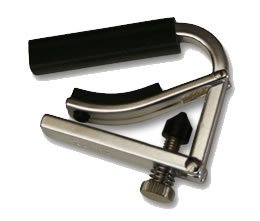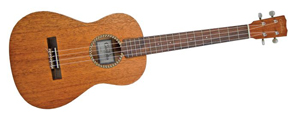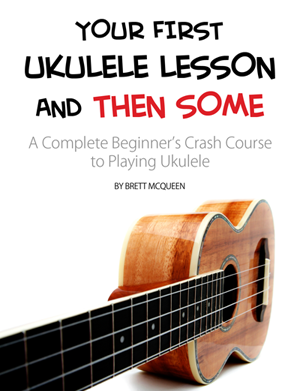At the moment, I do not have any songs or lessons that specifically pertain to the baritone ukulele. I realize this may be disappointing for you baritone players, and I want you to know that I plan to create some baritone ukulele lessons in the future.
Until then, I want to show how you can use your baritone ukulele to still follow and play along with me in my standard-tuned lessons on UkuleleTricks.com. Many of my students in my Strumming Tricks course, who own a baritone ukulele, use these tips to follow along and improve their strumming right with me.
1. Figuring Out Chords on the Baritone Ukulele
If you don’t know already, soprano, concert and tenor ukuleles are commonly tuned to standard tuning: g-C-E-A. A baritone ukulele is tuned lower like the bottom four strings of a guitar: D-G-B-E. A baritone ukulele has a deeper, lower-pitched sound. Learn more about the differences between ukulele types here.
Because of the differences in tuning, at the moment, the chord diagrams I present in the course material sound in a different key when played on a baritone ukulele. This means, in order to strum along with me in my video lessons, you are required to figure out the chord positions separately on your baritone ukulele.
The easiest way to figure out chords on a baritone ukulele is to use the Ukulele Tricks Baritone Chord Library.
When you’ve figured out the chord positions on your baritone ukulele, you can play and strum those chords along with me in my video lessons, or anyone else that is playing a standard tuned ukulele. The finger positions for the chords will be different between the ukuleles, but if played correctly, they will sound together in the right key.
This is the main way to follow along but you can also use another way to use your baritone ukulele to play along with standard-tuned ukuleles.
2. Use a Ukulele Capo to Transpose Your Playing to Standard Tuning

Shubb L9 ukulele capo
One of the easiest ways to follow along with me in my videos is to use a ukulele capo on the 5th fret of your baritone ukulele’s neck.
A ukulele capo is a small device that barres (that is, holds down) all of the strings at whichever fret you place the capo. By placing the capo at the 5th fret, you transpose your baritone ukulele’s tuning to G-C-E-A, which are the notes in standard linear tuning.
This means with the ukulele capo you can play the same chord positions on your baritone ukulele that I am using in my ukulele lesson videos, and your playing and my playing will sound together in the same key.
I recommend the Shubb L9 ukulele capo because of the ability to adjust how hard the capo clamps around the neck of your ukulele. The Kyser banjo capo
is a cheaper and worthwhile alternative, but in my experience, if you’re not careful with how you place the Kyser capo, it can sometimes pull your strings out of tune relative to one another.
Moving Forward
My intention is to give you baritone ukulele players some love and provide you all with some really great baritone ukulele lessons in the future. Until then, hopefully this can help you bridge the gap that can sometimes exist with playing along with standard-tuned ukuleles.
Are you a baritone ukulele player? What questions do you have about playing your baritone ukulele with standard-tuned ukuleles? Tell me by posting your comment below.


